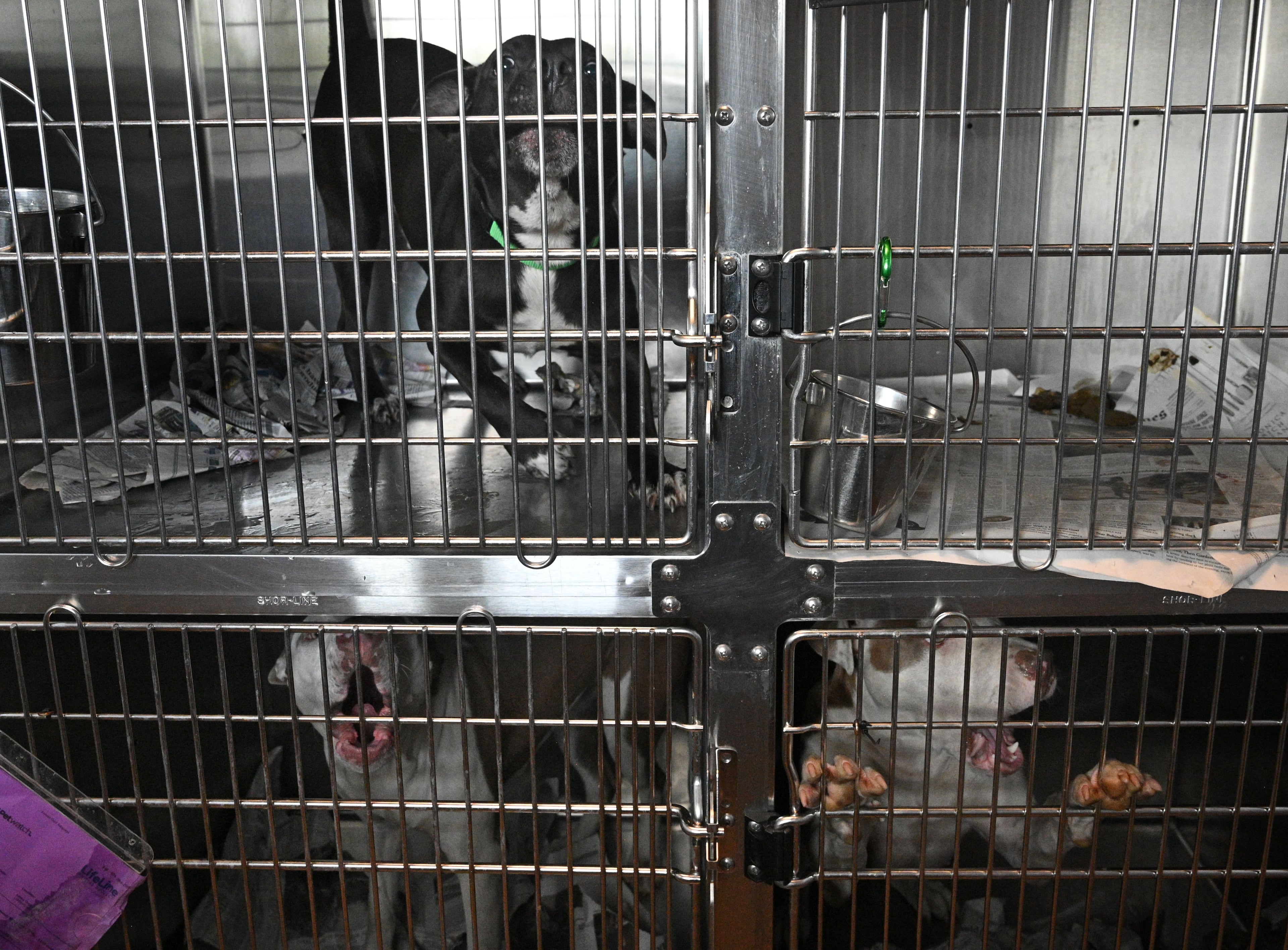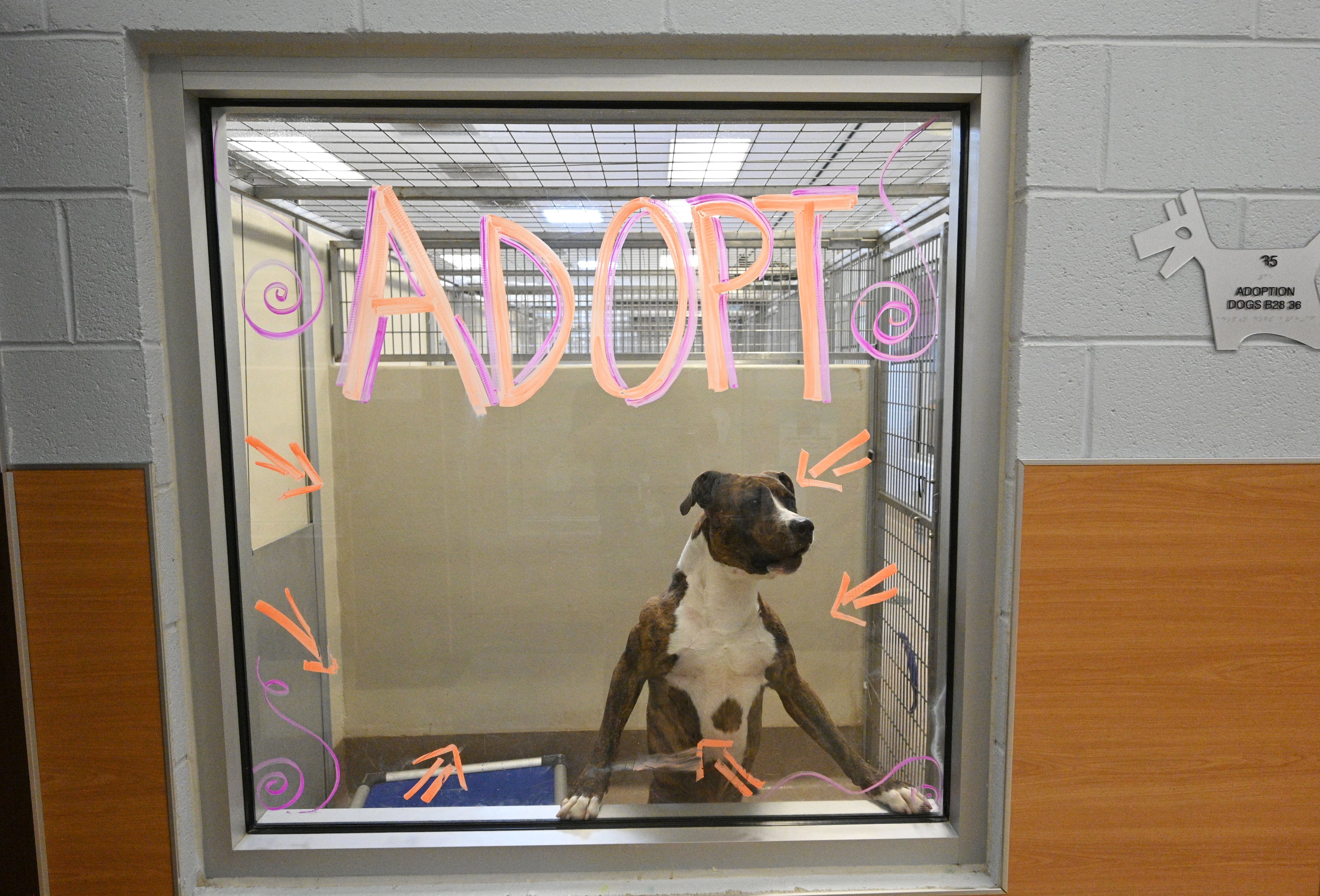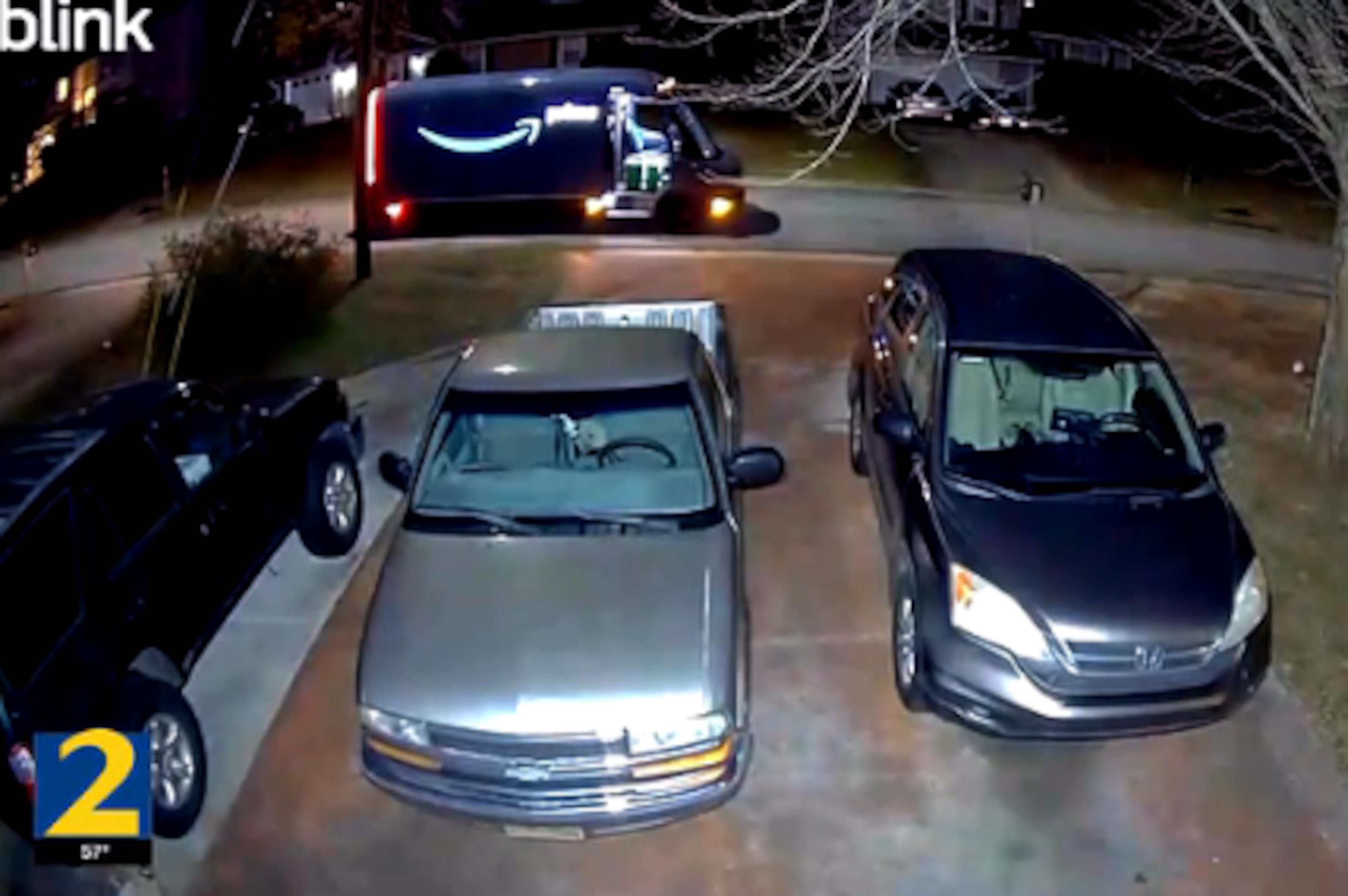DeKalb animal shelter plagued by repeated issues

State inspectors flag the same problems at the DeKalb County animal shelter almost every visit.
Cages so small dogs can’t stand up or turn around inside them. Enclosures caked with fecal matter and urine. Air ducts clogged with animal hair.
Like many around the country, DeKalb’s shelter has been overwhelmed with animals that come in faster than they can be adopted. But the shelter in Chamblee, managed by the nonprofit LifeLine Animal Project, is struggling more than most.
Since the start of 2022, ongoing health and safety issues at the shelter have prompted visits from Georgia Department of Agriculture inspectors at a rate higher than all other public shelters in metro Atlanta combined.
Conditions reached a crisis point early in September when LifeLine, which was founded with a mission to eliminate euthanasia, announced that it was putting down dogs because they had run out of space. At various points in recent months, the shelter has been home to nearly 700 dogs, far above its 400-dog maximum capacity.
The euthanasia decision was one of necessity because the conditions aren’t humane, LifeLine CEO Rebecca Guinn said.
“This is a drastic and stop-gap measure but it is not by any means a good solution,” Guinn said in an interview with The Atlanta Journal-Constitution.
LifeLine’s “no-kill” mantra is what attracts many volunteers. But some are now questioning whether that approach is feasible after seeing animals in LifeLine’s custody living in conditions that could get a private owner charged with neglect.
LifeLine has also struggled to retain veterinarians and other staff. Several volunteers said they’re losing confidence in LifeLine, and they wonder why county officials aren’t stepping in.
Volunteer Rachel Brown, who reported the shelter to the state in August, said she understands the desire to keep euthanasia rates low. But the scene she saw at the shelter horrified her. She shared videos of coughing dogs in dirty cages and a photo of a cat with blood dripping from its nose.
“It’s inhumane and criminal,” Brown wrote in her complaint.
She typically fosters dogs from Fulton County, where shelters also are managed by Lifeline but have had far fewer violations despite facing similar overcrowding issues.
When the plea went out in DeKalb, she and her husband offered to foster a dog on the euthanasia list. It was her first time visiting that shelter. The experience was so chaotic they decided against fostering from DeKalb at all.
“I just feel like if we were to foster for them, it’s just making more room for them to stuff another dog in those crates,” she said. “I don’t want any part of it.”
Guinn said LifeLine recognizes it must find ways to improve the conditions.
In response to questions from the AJC for this story, the county issued a press release announcing what it called a “comprehensive strategy to address overcrowding.” The release highlighted $2.7 million in funding that commissioners approved in September for various shelter-related issues. The bulk, $1.6 million, is for an overflow facility. The county is also piloting a program to help owners with financial hardships keep their pets.
DeKalb CEO Michael Thurmond said in a statement that LifeLine is “doing an exceptional job under very difficult circumstances.”
LifeLine Animal Project has run the county shelters in Fulton and DeKalb since 2013. Before then, the Atlanta-area rescue group didn’t have experience running public shelters, which unlike private shelters must accept every surrendered animal. LifeLine, founded in 2002, had operated a private dog shelter in Avondale Estates and two spay and neuter clinics but told the counties they could increase adoptions and lower euthanasia rates.
When LifeLine took over in DeKalb, one in three animals were being euthanized. Even accounting for the recent uptick in euthanasia rates, fewer animals are dying now. Between 2020 and 2022, euthanasia rates averaged around 4%, according to shelter statistics. Through the end of August, the rate this year was up slightly, to 7%.
Overcrowding has been an issue the whole time.
DeKalb built the shelter in Chamblee in 2017 and it was billed as a state-of-the-art facility. But it’s always been over capacity. It was made to comfortably hold 250 dogs but opened with about 400, Guinn said.
That’s not unlike the situation in Fulton, which is set to open a $40 million shelter this fall. Built to hold 367 dogs, it’s likely to be overcrowded from day one: Fulton’s main and overflow shelters were holding more than 450 dogs in September.
DeKalb has just the one shelter, but the county plans to fund an expansion if voters approve a special-purpose sales tax in November.
In the decade since outsourcing shelter operations, DeKalb has paid LifeLine at least $29.6 million and has approved an additional $600,000 to cover costs for the last three months of 2023. LifeLine subsidizes some operations through grants.
In September, commissioners OK’d a one-year contract extension for $5.7 million.

Repeat problems
State regulators are at the DeKalb shelter most months.
Overcrowding itself isn’t a violation, but it’s the type of problem that can cause a shelter to run afoul of other state rules such as uncleanliness and the extended use of temporary crates — recurring issues in DeKalb and the reason the shelter is on heightened monitoring.
Since the start of 2022, inspectors have been out to the DeKalb shelter at least 30 times, often with multiple inspectors.
Other area shelters had far fewer issues: In Fulton, inspectors made 14 visits. In Gwinnett and Cobb, inspectors visited a total of 10 times.
The Department of Agriculture temporarily blocked DeKalb from new intakes in May 2022 because of housekeeping and sanitation violations. The state issued a second stop order last December, which state officials said the shelter willfully violated by taking in an additional 207 animals.
State, county and shelter officials met in February to talk through the problems. The county submitted a compliance plan in March.
For a few months, reports showed evidence of improved conditions. But by August, volunteers like Brown were again filing complaints, according to inspection reports obtained through a public records request.
Michelle Schretter filed a complaint saying temporary crates lined the hallways, creating a fire hazard. “These animals are living in filthy tiny prisons that quickly degrade them,” she wrote.
Between June and August, 82 animals died in the shelter, higher than average, according to shelter records. That’s on top of 205 animals who were euthanized during those months.
Volunteer Kami Delgado, who walks dogs at the shelter a few days each week, said she went to walk a dog named Vortex this summer and noticed the usually excited dog was lethargic. Vortex had been neutered a few days earlier and put in a small cage with a cone around his neck. Delgado realized the rope holding the cone together was cutting into his skin.
“It looks as if he literally got sliced in the neck with a knife,” Delgado wrote to the shelter director in an Aug. 8 email. It seemed to her that no one had checked on Vortex in days.

Vortex needed stitches. In emails to Delgado, shelter staff said they were unaware of the dog’s surgery.
The shelter has two veterinarian positions, but it’s been hard to keep both filled, Guinn said. For a short period, the clinic had none. LifeLine pulled vets from its clinics in Fulton to help cover.
There are fewer sick animals at the shelter now, Delgado said, but staff still seem outmanned. She found the floor of one room covered in smeared feces and torn-up newspapers over the Sept. 29 weekend.
The sheer number of dogs also means they get limited attention. Volunteers keep track of when dogs are walked on whiteboards outside kennels. Regularly, Delgado said she sees dogs who haven’t been walked in a week. Other volunteers said that is a frequent occurrence.
And on top of animals in the shelter, staff are managing as many or more in foster homes. Volunteer Julie Orlansky said staff seem overwhelmed by that, too. Orlansky decided to foster in July after hearing about the overcrowding and realizing that dogs were going days without being walked. Orlansky said she told staff that she had pets at home and could only foster a healthy dog. But after she took Brambleberry home, she noticed the dog was coughing.
When she called the shelter, staff discovered Brambleberry was being treated for kennel cough, Orlansky said. The dog’s digital medical records hadn’t been updated but there was a note in her cage, along with medicine she’d been prescribed. Orlansky hadn’t been told about any of this.
“I was surprised they sent me home with a sick dog,” Orlansky said.
Persistent overcrowding
State officials were back at the shelter Oct. 5 for a re-inspection. There were 581 dogs at the shelter and the inspector wrote in her report that the facility appeared “much cleaner” than when she visited in September.
Still, she found several dogs lying in their own feces and urine, surrounded by spilled dog food. Some of the dogs had fecal matter in their fur. The inspector scheduled another visit for later this month.
It used to be easier for LifeLine to deal with the overcrowding, Guinn said. In her 20-plus years leading the animal welfare organization, she said conditions have never been as challenging as they are now. Fewer people are adopting from shelters. But rescue groups also take fewer dogs out of the shelter because they’re having the same difficulty finding adopters. Many families are feeling squeezed financially, prompting an uptick in owner surrenders.
And in DeKalb, there’s also the issue of the roughly 100 dogs waiting on a backlogged court system after being seized by animal control in cruelty or neglect cases.
“It’s a system that’s overwhelmed,” Guinn said.
LifeLine’s pleas for adopters and fosters have had varied results. It’s saved many dogs, but Guinn said she worries people are getting so used to the “urgent” requests they don’t feel urgent anymore. The overall population in the shelter hasn’t budged much, either. The recent call to get 250 dogs out was largely successful, but then 220 new dogs came in.

No-kill shelters are a newer concept.
Supporters say the old model resulted in unnecessary animal deaths. The no-kill approach, which aims to limit euthanasia to no more than 10%, buys animals with minor behavioral issues or treatable medical conditions more time to find a home.
LifeLine’s no-kill pledge was what drew Melanie Slawienski to volunteer. She started fostering a dog from the Fulton shelter over the summer and only discovered after bringing her home that the dog was blind — something the shelter didn’t tell her.
Slawienski said she wants to continue fostering but isn’t sure she wants to work with Lifeline again. The conditions at the DeKalb shelter have also made her rethink her position on no-kill shelters, though it’s something she still wrestles with emotionally.
“Is it really feasible?” Slawienski asked. “And is it kind?”
Teresa Chagrin, an animal care and control specialist with the People for the Ethical Treatment of Animals, said a lot of people are coming to question no-kill policies. It often results in overcrowding, and it diverts resources away from efforts to prevent overpopulation, she said.
At the DeKalb shelter, because spay and neuter appointments are backed up until 2024, some dogs are being adopted without having had the procedure. Owners are simply told to come back.
“Taxpayers should be upset that the state has to spend so much of its time just repeatedly responding to complaints about these horrific conditions,” Chagrin said. “If your neighbor was keeping dogs in these conditions, you would call law enforcement, and law enforcement would act, because this is just inhumane.”
Adopt or foster a dog
Throughout October, the usual $85 dog adoption fee is half-off to help address overcrowding.Those interested in adopting or fostering can visit any LifeLine shelter:
- DeKalb County shelter: 3280 Chamblee Dunwoody Road (open Monday, Tuesday, Thursday and Friday from 11 a.m. to 7 p.m. and Saturday and Sunday from 11 a.m. to 6 p.m.)
- Fulton County shelter: 860 Marietta Blvd. (open Monday, Tuesday, Thursday and Friday from 11 a.m. to 7 p.m. and Saturday and Sunday from 11 a.m. to 6 p.m.)
- Fulton County Midtown overflow shelter: 981 Howell Mill Road NW (open Monday, through Friday from 11 a.m. to 7 p.m. and Saturday and Sunday from 11 a.m. to 6 p.m.)
- Fulton County Community Animal Center: 3180 Presidental Drive (open Monday, through Friday from 11 a.m. to 7 p.m. and Saturday and Sunday from 11 a.m. to 6 p.m.)
What to do if you find a loose animal
If you find a stray animal, they don’t need to be taken to the shelter immediately. If you can’t locate the owner nearby and the animal doesn’t have an ID, first take the animal to the nearest veterinarian for a microchip scan. Then, file a found report with the DeKalb County shelter: https://dekalbanimalservices.com/found-pets/
If you can’t find the family within 48 hours and are in DeKalb County, you can participate in the “Friendly Finder” program and keep the dog for five days during its mandatory hold period. It makes it more likely to find a nearby owner and keeps the dog out of the shelter.
Help for owners in need
LifeLine’s community support team can connect owners in need of pet food with resources. The support team can also help owners dealing with housing issues because of a pet and can refer owners to low-cost veterinary resources. Contact the shelter for assistance.
If you need to re-home your pet, you can create a profile at rehome.adoptapet.com. Select LifeLine Animal Project as the referring shelter and use coupon code RCXHAQTL2U8AD8Z to waive the listing fee.



